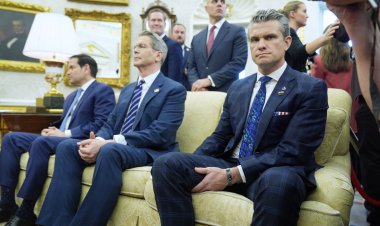Trump’s victory overshadows Chinese solar project in Texas
Trina Solar established a Texas factory with plans to secure nearly $2 billion from the Inflation Reduction Act. However, the company shifted its strategy the day after Donald Trump won the election.

Trina Solar was poised to receive nearly $1.8 billion in tax credits under President Joe Biden’s climate law, joining other Chinese solar companies establishing factories in the United States to leverage the incentives included in the Inflation Reduction Act. However, President-elect Donald Trump has pledged to dismantle Biden’s climate initiatives and take a strong stance against economic competition from China.
In response to the sale of the Dallas-area factory to Georgia-based battery manufacturer Freyr, Trina asserted that Trump’s victory had “nothing to do” with the decision, emphasizing that it was driven by the company’s long-term growth strategy in the U.S.
“Rather, it is based on the company’s long-term growth in the country,” a spokesperson said in a statement.
Analysts observed that this development highlighted the influence of Trump’s victory on energy markets.
With Republicans likely to have control of both chambers of Congress starting in January, attention is now directed at the future of the IRA. Key discussions will revolve around the continuation of generous tax breaks for companies producing solar panel parts and other clean energy components within the United States.
Lawmakers from both parties have already introduced several bills aimed at restricting Chinese-linked firms from obtaining tax credits under the IRA. Industry analysts and lobbyists expect these discussions to intensify following the recent Republican victories.
Republicans have also expressed dissatisfaction with Biden’s approach to Chinese-made solar products, including a two-year delay in enforcing stricter trade barriers on equipment imported into the U.S. from Southeast Asia.
"Democrats made a mistake when they failed to prohibit China from being eligible for the IRA tax credits, and the Biden administration's solar tariff moratorium was a disastrous policy that allowed China to overproduce and flood the market in an effort to harm U.S. solar manufacturers and undermine the IRA," said Nick Iacovella, a former aide to Sen. Marco Rubio and a senior vice president at the Coalition for a Prosperous America, a trade group representing U.S. manufacturers. “That’s not going to happen under Trump.”
Trina’s sale surprised industry observers and local officials alike. Sheila Petta, the mayor of Wilmer, Texas, where the newly completed 1.35-million-square-foot factory is located, expressed her shock upon being contacted by a reporter about the sale.
“That is the first I’ve heard of it,” she remarked. “I speak to Trina all the time, and I’ve not spoken to them about this.”
The transaction was first announced on Wednesday morning by Freyr, a small battery manufacturer that moved operations to the United States from Europe late last year to take advantage of IRA tax credits. The company, which also operates in Norway, plans to build a battery factory in Georgia.
Trina confirmed the arrangement in a release on Friday, with expectations that it will be finalized this year.
As part of the deal, Trina may acquire an approximately 20 percent stake in Freyr, appoint representatives to its board, and market panels under the Trina name. Meanwhile, Freyr will own and operate the factory, which is designed to produce enough solar panels annually to power 500,000 homes. Production began on November 1, according to statements from both Trina and Freyr.
This also marks Freyr's first foray into solar manufacturing.
Trina assured that it “will continue to serve the U.S. market with industry-leading smart PV and energy storage solutions, technology and manufacturing expertise,” in a statement.
Freyr CEO Dan Barcelo emphasized to PMG that the company would maintain complete ownership of Trina's solar manufacturing assets, noting that discussions with Trina began earlier in the year. He also confirmed that Freyr would control any tax benefits resulting from the deal.
“This transaction is not really about politics. It's about economics,” Barcelo stated. “We really believe in solar and batteries longer term and we saw an opportunity to invest in this very strong asset.”
While the IRA includes provisions that prevent Chinese automakers from benefiting, it does not impose similar restrictions on Chinese solar manufacturers, who remain dominant in the global panel market. Trina is among eight major solar manufacturers with ties to China that are moving forward with new factories in the U.S., according to PMG's review.
The establishment of these Chinese-owned factories has sparked considerable debate within the solar industry. Advocates argue that facilities like Trina’s represent progress in the U.S. transition to cleaner energy by creating jobs, lowering solar installation costs, and contributing to emissions reductions. They contend that the U.S. is still developing its supply chain and that most technological expertise currently resides in Asia.
Conversely, critics warn that this trend makes the U.S. excessively dependent on China, which continues to dominate the market for essential subcomponents. They argue that the new facilities hinder efforts to cultivate a domestic solar manufacturing industry.
Barcelo noted that the transaction provides an opportunity for an American company to benefit from the law’s tax incentives while also enabling public investment.
“Prior to this, no one could invest in it,” he elaborated. “It was a private asset by a U.S. subsidiary of a Chinese-owned company. Now it's a publicly traded company that investors have access to, and I think that's a great thing.”
While acknowledging potential changes to the U.S. clean energy manufacturing landscape under Trump, Barcelo reaffirmed the company’s commitment.
“We looked at all that, and in the current environment, we still think reshoring and bringing manufacturing to the U.S., U.S. jobs ... that’s all good,” he said. “It's good for U.S. energy security [and] it's good for U.S. national security.”
As Republicans prepare to assume power next year, they will seek ways to finance some of Trump’s proposed trillions of dollars in tax cuts, with some offsets potentially coming from amending or repealing parts of the IRA, analysts and lobbyists indicated.
However, provisions in the law benefiting manufacturing are seen as appealing by many Republicans, according to Iacovella.
Companies have revealed plans to build or expand an estimated 555 manufacturing facilities that could capitalize on the IRA, amounting to at least $153.4 billion in intended investments and potentially creating around 160,000 jobs, PMG reported last week. A significant portion of these investments is targeting GOP districts, and nearly 100,000 jobs could become available during Trump’s upcoming term.
“There is no appetite to repeal the tax credits that have led to the job creation, investment and manufacturing capacity from the IRA,” Iacovella stated.
The same sentiment does not extend to Chinese companies, however. Many analysts predict that Republicans will pursue measures to prevent Chinese firms from accessing credits under 45X, a crucial manufacturing provision in the law that has sparked a surge of project announcements.
“It seems like there is a good chance that something to this effect will eventually be passed,” remarked Elissa Pierce, a solar analyst at the consulting firm Wood Mackenzie. “I have spoken with some Chinese manufacturers who have floated the idea of partnering with a U.S. company as a strategy to avoid being blocked from getting the 45X tax credits for their U.S. factories, so this could be Trina's motivation for the sale.”
Trina has been embroiled in a broader trade conflict that has polarized the solar industry. Panel manufacturers based in the U.S., Europe, and South Korea have accused Chinese companies of saturating the market with low-cost panels and have called for increased tariffs on Chinese imports. In 2023, the Commerce Department accused Trina of circumventing American tariffs on Chinese solar imports by routing goods through Southeast Asia for minimal processing before sending them to the U.S.
These calls have triggered concerns among some American solar developers who depend on Chinese panel suppliers and fear that tariffs could raise the costs of new solar projects.
Trump’s victory introduces another layer to this ongoing debate. The former and future president has committed to increasing tariffs by 20 percent on all imports and imposing an additional 60 percent levy on Chinese imports.
Iacovella suggested that Trina’s sale could be a strategic move to circumvent potential U.S. restrictions on Chinese companies benefiting from the IRA.
“The Chinese are, and have been for a long time, very adept at reading the tea leaves and navigating U.S. policy,” he commented. “I think they saw Trump got elected and they saw the writing on the wall very clearly.”
Rohan Mehta for TROIB News
Discover more Science and Technology news updates in TROIB Sci-Tech












